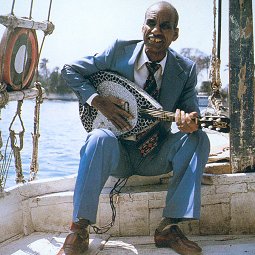 |
In 1942, Kuban moved to Cairo where he studied at the Boy Scout's college, and worked as an apprentice to a tailor. By then, he had also learned to play clarinet and girba (bagpipes) and begun to get work as a musician. Living among displaced Nubians in the neighborhood of Abdin, he found many opportunities to play at week-long Nubian weddings, where complex tar (frame drum) and hand-clap rhythms, girba and traditional chants enliven pre-nuptial bashes. Kuban had an epiphany when he heard a jazz band from Harlem performing at Cairo's Gezira Sporting Club. The blended sounds of trombone, saxophone, clarinet and guitar and drums was a revelation, and he instantly wanted to experiment along those lines himself. "They were all black," Kuban once said. "We all related very strongly. I wondered why we weren't doing something similar…I never considered any political implications." After playing in the orchestra for the opera Aida in 1949, Kuban began to work the clubs in Cairo, Alexandria and Aswan, revamping the old music with sax, electric guitar, bass, organ, trumpet and accordion.
Of course, there were objections from purists who felt he was denaturing Nubian music by introducing Western harmonies and instruments. Some called Kuban's style Nubi-shaabi, allying it with the youth-oriented, street pop music of Cairo. Whatever it was called, Kuban's music caught on in a big way. In 1964, the newly built Aswan dam created Lake Nasser, the world's biggest man-made lake. The project displaced 100,000 Nubians many of whom went to cities, filled with a nostalgic love for their buried past. This influx assured Kuban and his musicians all the work they could handle.
Later on, when the "world music" phenomenon began to bubble up in Europe and the U.S., Kuban brought his modern take on Nubian culture to the world. He made his international debut at Berlin's Heimatklaenge festival in 1989, and went on to perform widely, including appearances at France's MIDEM conference in 1993, the WOMAD festival in Japan and the Montreal Jazz Festival in 1994, and at Central Park Summerstage in New York in 1995.
Employing over 60 musicians and operating seven bands, Kuban continued playing traditional and popular music for both urban and rural Nubian enclaves in Cairo until he died there from a heart attack in June, 2001.
|
|